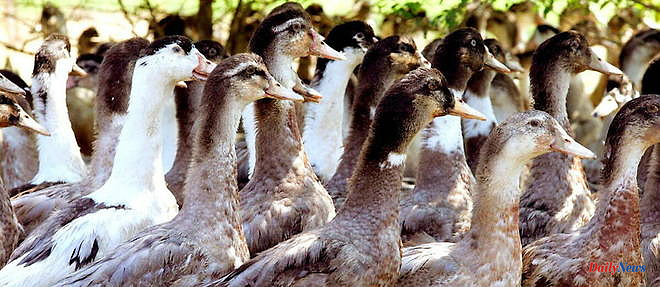This is news that will satisfy breeders. Mulard ducks, bred for foie gras, will soon be able to be vaccinated against bird flu. Two vaccines tested in France have proven to be "very effective" in protecting animals from the virus, the health agency Anses said on Thursday (May 25). With these results, therefore, the possibility of a national vaccination within a few months opens up. "As of the fall of 2023," the Ministry of Agriculture wrote on its website.
This would make it possible to limit and stem the increasingly serious crises which have multiplied in recent years, leaving breeders no respite. More than 20 million poultry were slaughtered in 2021-2022, and already more than 6 million in 2022-2023. With each epizootic, infected animals (mainly waterfowl) are slaughtered, preventive slaughter of nearby healthy animals is decided and poultry production is permanently disrupted.
These avian flu crises have prompted European countries to look into a vaccine strategy. In France, an experiment was launched last year around two candidate vaccines for waterfowl, developed by the Boehringer Ingelheim and Ceva Animal Health laboratories. European neighbors are testing vaccines in other poultry species.
The French experiment involved several thousand ducks, vaccinated or not. They were euthanized at the end of the process. The virus currently circulating in France and around the world was inoculated into some of the ducks, previously vaccinated, to measure how much virus they excreted, and if they could still contaminate their congeners. "Vaccination resulted in very little excretion of the virus in inoculated animals", whether "by the respiratory or digestive route", summarized Béatrice Grasland, head of ANSES's national reference laboratory for avian influenza Ploufragan-Plouzané-Niort.
Without a vaccine, "an inoculated animal would infect another animal every two hours," the researcher explained.
After a lull of a month and a half, the virus has been spreading again since the beginning of May in more than 70 farms in the South-West, in particular in the Gers.
France plans to vaccinate ducks as a priority (of the Mulard type, but also Peking and Barbary - the latter being rather raised for their meat) because of their "particular role" in the dynamics of the epizootic. The vaccination of "future laying pullets" is also envisaged, indicates the ministry, "with a view to preserving egg production capacities [...] and taking into account the weakening of the sector during past crises".
Ducks are very susceptible to the virus and excrete it into the environment even before showing symptoms, which contributes to the low noise spread of avian flu.
Vaccination raises technical (will we have enough doses but also staff to inject them and ensure post-vaccination surveillance?), economic (who will pay?) and diplomatic questions, poultry professionals fear that markets for export are closed if animals are vaccinated.












